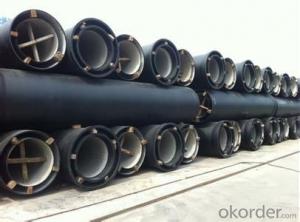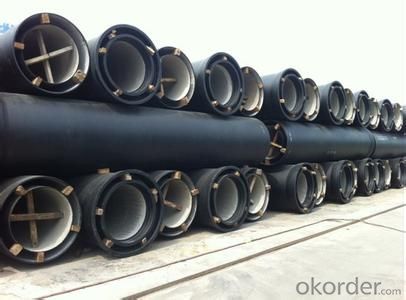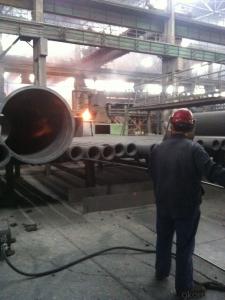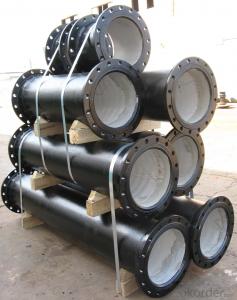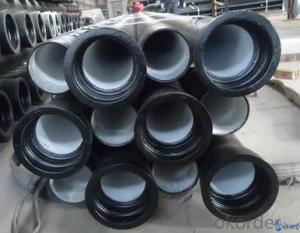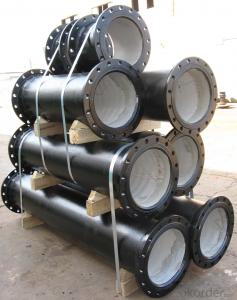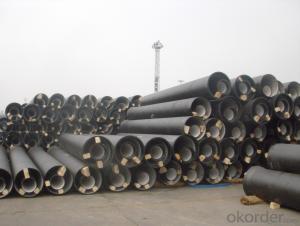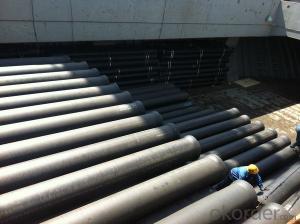DUCTILE IRON PIPES AND PIPE FITTINGS K8 CLASS DN800
- Loading Port:
- Tianjin
- Payment Terms:
- TT OR LC
- Min Order Qty:
- 22 pc
- Supply Capability:
- 3000 pc/month
OKorder Service Pledge
OKorder Financial Service
You Might Also Like
Material : Ductile Cast Iron
Size Range : DN 80mm to DN 2000mm
Unit Effective Length : 6m or 5.7m
Manufacture Standard: ISO 2531:1998/ EN 545:2006/EN 598:2007
Annual capacity : 200,000 tons
Coating Exterior: Zinc 130g/m2 according to ISO 8179-1 and bitumen coating 70 microns.
Cement Interior: Portland Cement/ High Alumina Cement/ Sulphate Resisting Cement Lining according to ISO 4179
Special requirements on external coating and internal lining can be applied
We also provide accessories such as SBR/EPDM rubber gaskets, lubricant paste, pipe caps, PE sleeves, etc.
Additional Parts:
Each pipe is strictly inspected according to related standard to ensure permanently high performance.
Easy Installation at site and service free for life
Long Service Lifespan
Quotation will arrive you within 24hours once we get your inquiry.
We guarantee offering you a competitive price.
A copy of original inspection reports of pipes will be offered after shipment.
Photos of loading process will be sent to the customer after shipment effect.
We will follow-up the delivery progress after shipment effect and update to the customer on weekly basis.
- Q: Can ductile iron pipes be used for mining applications?
- Mining applications can indeed utilize ductile iron pipes. These pipes possess exceptional mechanical properties, including high tensile strength, impact resistance, and durability. As a result, they are well-suited for a range of challenging environments, including mining operations. The pipes are capable of withstanding substantial loads and pressures, making them ideal for the transportation of water, slurry, and other fluids utilized in mining processes. Moreover, ductile iron pipes have a smooth internal surface that minimizes friction and promotes the efficient flow of materials. Consequently, they find extensive use in tasks such as dewatering, tailings disposal, and the transport of corrosive or abrasive substances within the mining industry. Overall, due to their strength, durability, and suitability for demanding conditions, ductile iron pipes offer a dependable and cost-effective choice for mining applications.
- Q: How does ductile iron pipe perform in high-pressure gas applications?
- Ductile iron pipe performs well in high-pressure gas applications due to its inherent strength and durability. Its ability to withstand high internal and external pressures makes it a reliable choice for transporting gases safely and efficiently. Additionally, ductile iron's resistance to corrosion and its tight joints further enhance its performance in high-pressure gas environments.
- Q: What is the composition of ductile iron pipes?
- Ductile iron pipes are primarily composed of iron, along with small amounts of carbon, silicon, and other alloying elements. The iron content typically ranges from 90% to 94%, while carbon content is usually around 3% to 4%. Silicon is added in the range of 1.5% to 3%, which helps enhance the ductility and strength of the iron. Other alloying elements such as manganese, sulfur, and phosphorus may also be present in smaller quantities. The composition of ductile iron pipes is carefully engineered to achieve specific properties. The addition of carbon and silicon improves the hardness and strength of the iron, making it more suitable for demanding applications. The presence of these alloying elements also contributes to the ductility of the pipes, allowing them to be easily bent and molded without breaking. Overall, the composition of ductile iron pipes is designed to provide a balance between strength, ductility, and resistance to corrosion. This makes them ideal for use in water and sewage systems, where they can withstand high pressure, handle heavy loads, and resist the corrosive effects of water and other chemicals.
- Q: Can ductile iron pipes be used for drainage systems in airports?
- Yes, ductile iron pipes can be used for drainage systems in airports. Ductile iron pipes are known for their strength, durability, and resistance to corrosion, making them suitable for various applications, including drainage systems. They can effectively handle the high flow rates and heavy loads typically associated with airports, ensuring efficient drainage and preventing water accumulation on runways, taxiways, and other areas.
- Q: DN300 what's the price of the ductile iron pipe / the weight and the price of one meter?
- Graphite is exist in spherical form, usually graphite size is 6-7, casting spheroidization grade control requirements for 1-3 quality (spheroidization rate greater than 80%), so the mechanical properties of the material itself has been improved, has the essence of iron, steel performance.
- Q: How does ductile iron pipe perform in areas with high ground movement?
- Areas with high ground movement are well-suited for the exceptional performance of ductile iron pipe. Its unique properties and design ensure a high resistance to deformation and damage caused by ground shifting, settling, or seismic activities. The material's ductility enables it to withstand significant stress and strain without fracturing or breaking, setting it apart from rigid materials like cast iron or PVC. Ductile iron pipe's ability to flex and absorb ground movement prevents catastrophic failures and guarantees the integrity of the pipeline system. Moreover, ductile iron pipe is manufactured with various joint configurations that enhance its performance in areas with high ground movement. Flexible joints, like restrained or mechanical joints, effectively accommodate movement by allowing limited rotation and translation, minimizing the risk of pipe separation or joint failure. Additionally, the robust construction of ductile iron pipe, featuring a thick wall thickness and high tensile strength, offers added protection against ground movement. This strength enables the pipe to withstand external loads and forces induced by the ground, maintaining its structural integrity and preventing deformation. To summarize, ductile iron pipe is an excellent choice for areas with high ground movement due to its exceptional ductility, flexible joints, and robust construction. Its ability to absorb ground movement while ensuring the functionality and safety of the pipeline system establishes it as a reliable and durable option in challenging environments.
- Q: What are the disadvantages of using ductile iron pipes?
- Using ductile iron pipes in various applications comes with several drawbacks. Firstly, these pipes tend to be more expensive compared to other types like PVC or HDPE, which can be problematic for projects with budget constraints. Secondly, their relatively heavy weight makes transportation and installation more labor-intensive and time-consuming. This increases overall project costs, especially when specialized equipment and skilled workers are required. Another disadvantage is their susceptibility to corrosion. Exposure to environmental factors, like soil conditions and water chemistry, can lead to rust and scale formation on the inner and outer surfaces of the pipe. This reduces the pipe's lifespan and potentially affects water quality. Furthermore, ductile iron pipes can crack or break under certain conditions, especially when subjected to heavy loads or significant ground movement. This necessitates costly repairs or replacements, causing additional expenses and disruptions to the water supply. Lastly, ductile iron pipes have relatively low resistance to impact and abrasion compared to other materials. This makes them more vulnerable to damage from external forces, such as construction activities or accidental impacts, resulting in increased maintenance and repair costs. In conclusion, while ductile iron pipes have advantages like high tensile strength and durability, it is crucial to consider these disadvantages before deciding to use them in a specific project.
- Q: Can ductile iron pipes be used in earthquake-prone areas?
- Ductile iron pipes are suitable for use in areas prone to earthquakes. This material, known for its strength and flexibility, can withstand the movement and vibrations caused by seismic activity. Its exceptional ductility means it can deform under stress without fracturing or breaking. Consequently, ductile iron pipes are capable of absorbing the energy produced during an earthquake, minimizing the risk of pipe failure or rupture. Moreover, these pipes have a proven track record in seismic zones, attesting to their resilience and dependability in such regions. Nevertheless, it is crucial to emphasize the importance of proper installation and design considerations, including the use of appropriate jointing methods and ensuring adequate anchoring. These factors are crucial to guarantee the optimal performance of ductile iron pipes in earthquake-prone areas.
- Q: Can ductile iron pipes be used for irrigation pivot systems?
- Yes, ductile iron pipes can be used for irrigation pivot systems. Ductile iron pipes have high tensile strength and durability, making them suitable for handling the pressure and load requirements of irrigation pivot systems. Additionally, their corrosion resistance makes them a reliable choice for long-term use in such applications.
- Q: Are ductile iron pipes suitable for water distribution networks?
- Yes, ductile iron pipes are suitable for water distribution networks. Ductile iron pipes have been widely used in water distribution systems for many years due to their numerous advantages. Firstly, ductile iron pipes have excellent durability and long lifespan. They are highly resistant to corrosion, which is extremely important for water pipes as they are constantly exposed to various chemicals and substances in the water. This resistance to corrosion ensures that the pipes maintain their structural integrity over time, reducing the need for frequent repairs or replacements. Additionally, ductile iron pipes have high strength and can withstand high pressure, making them ideal for water distribution networks. They can handle heavy loads and resist external forces such as soil movement or traffic loads, ensuring the safety and reliability of the water supply. Furthermore, ductile iron pipes have excellent hydraulic properties. They have smooth internal surfaces that minimize friction and pressure drop, allowing water to flow efficiently through the system. This helps to conserve energy and reduce pumping costs, making ductile iron pipes a cost-effective choice for water distribution networks. Moreover, ductile iron pipes are versatile and can be easily installed in various soil conditions. They can withstand ground movement and settle without breaking, which is crucial for maintaining a stable water distribution system. In conclusion, ductile iron pipes are highly suitable for water distribution networks due to their durability, resistance to corrosion, high strength, excellent hydraulic properties, and versatility in installation. They provide a reliable and efficient solution for delivering safe and clean water to communities.
Send your message to us
DUCTILE IRON PIPES AND PIPE FITTINGS K8 CLASS DN800
- Loading Port:
- Tianjin
- Payment Terms:
- TT OR LC
- Min Order Qty:
- 22 pc
- Supply Capability:
- 3000 pc/month
OKorder Service Pledge
OKorder Financial Service
Similar products
Hot products
Hot Searches
Related keywords
